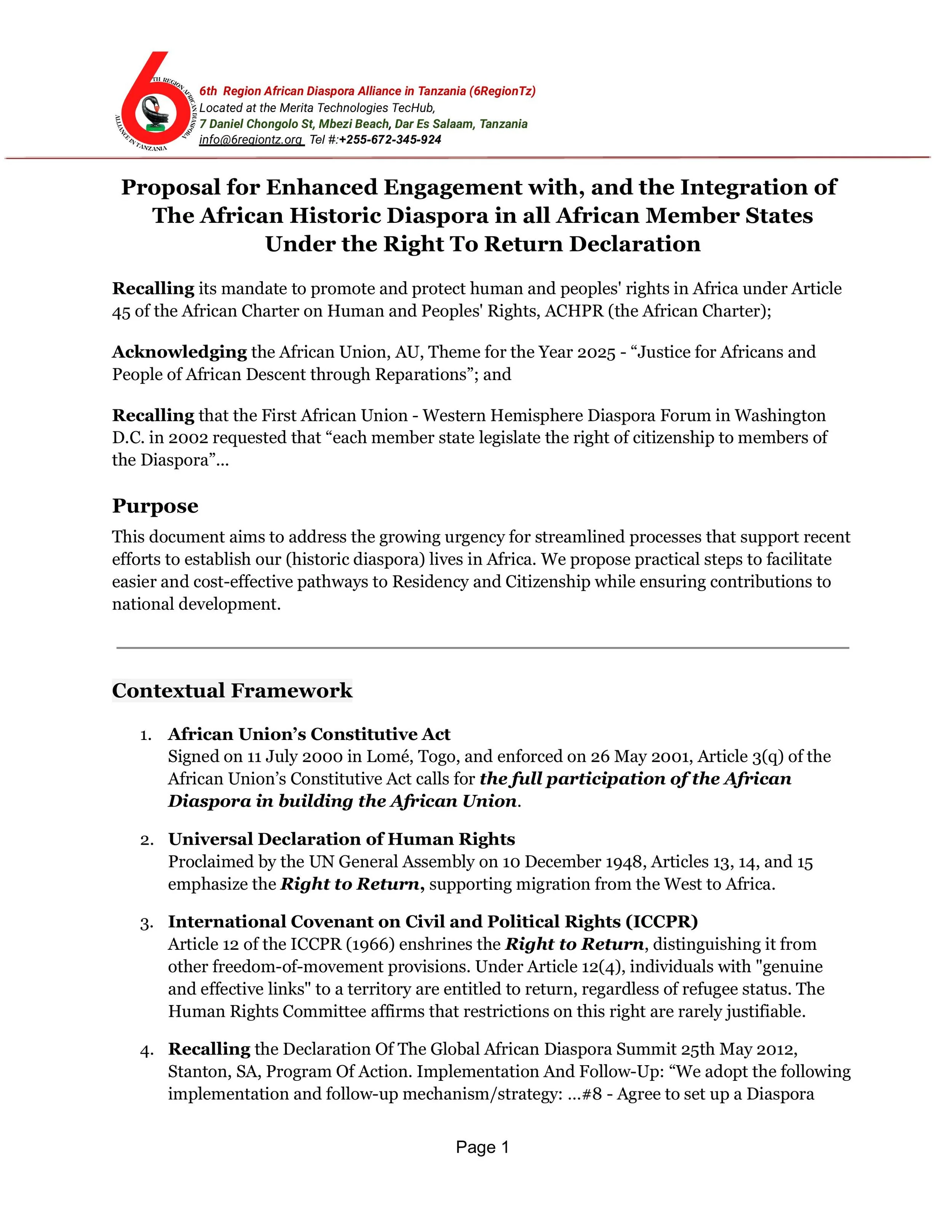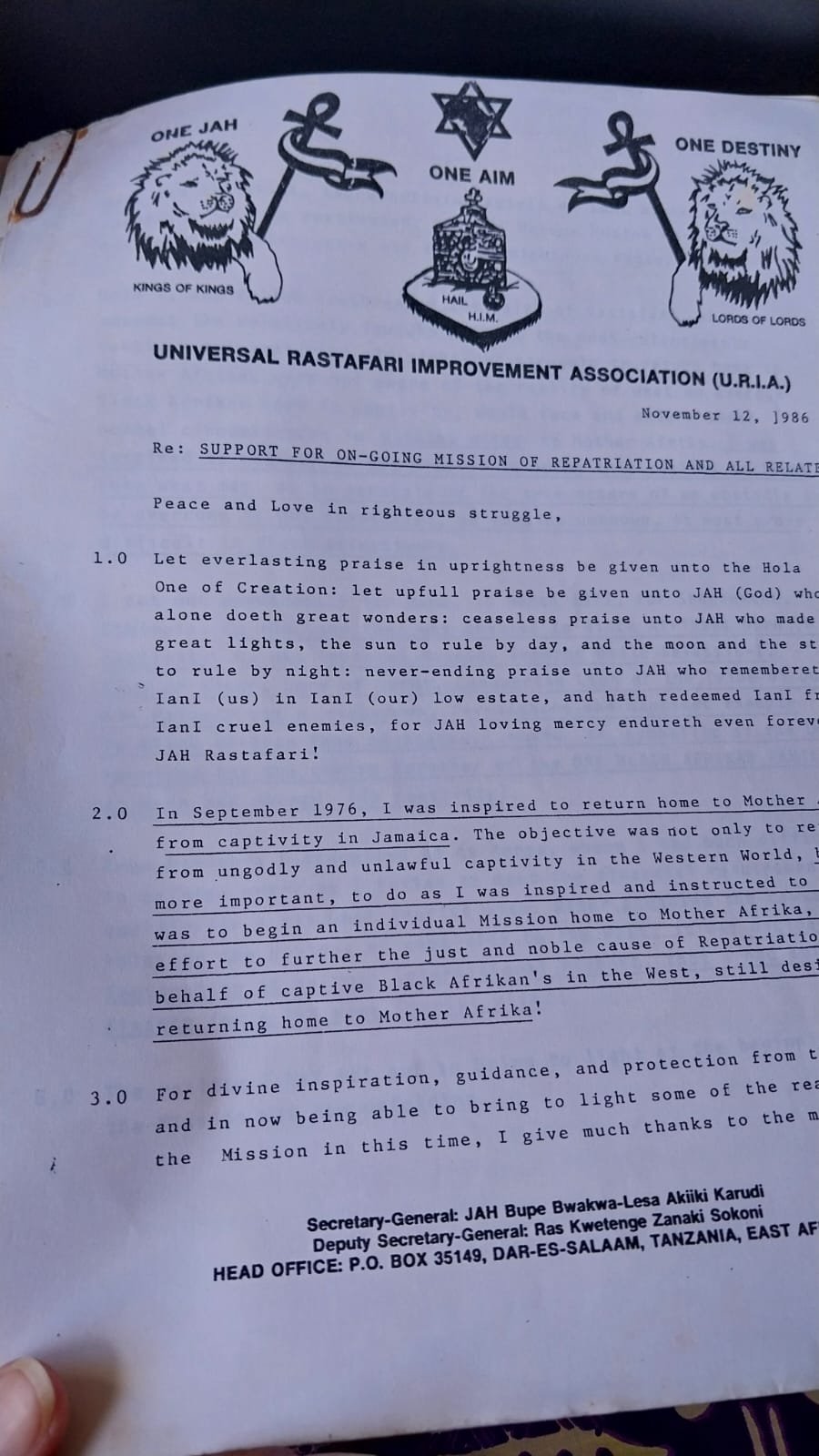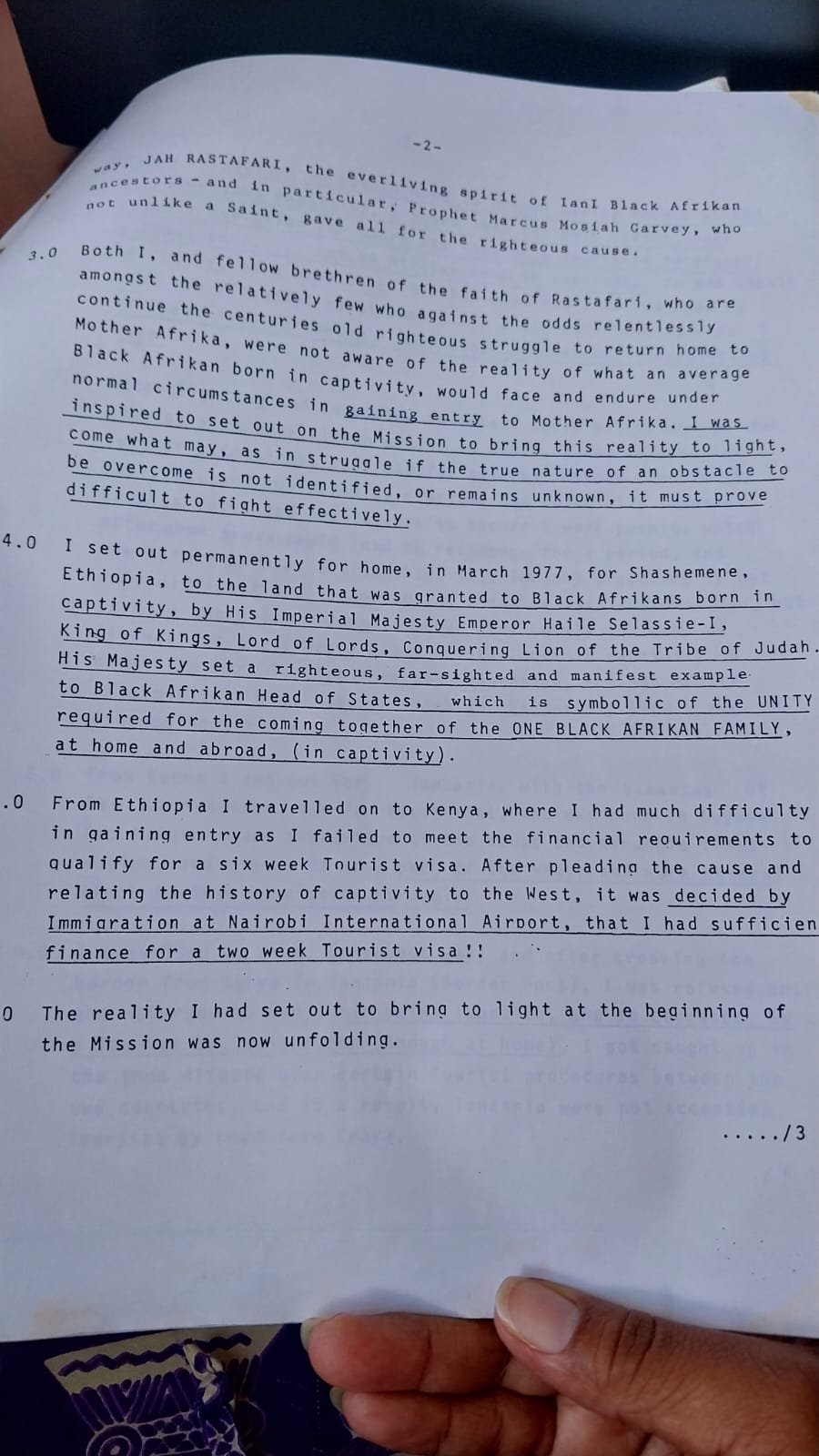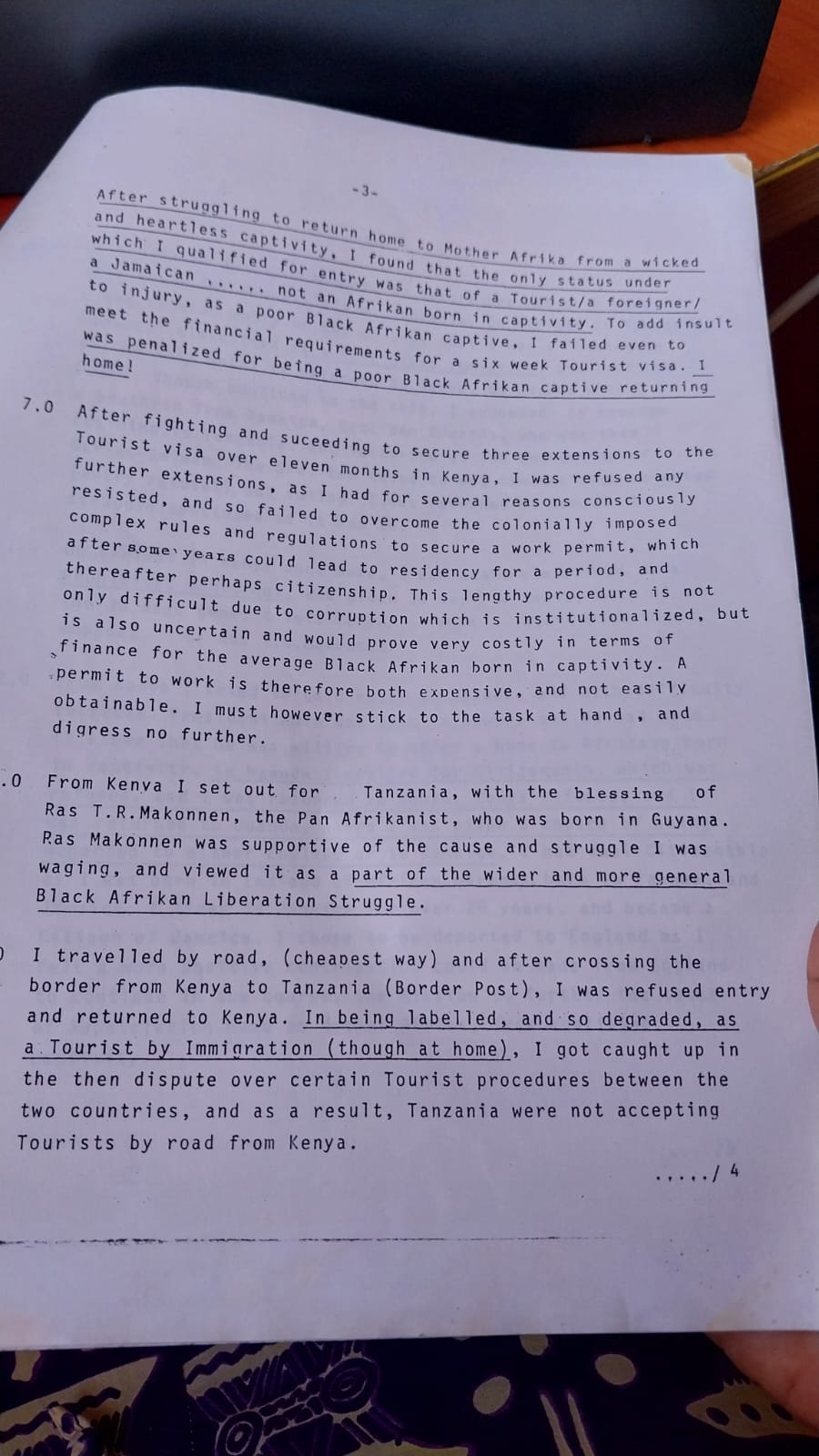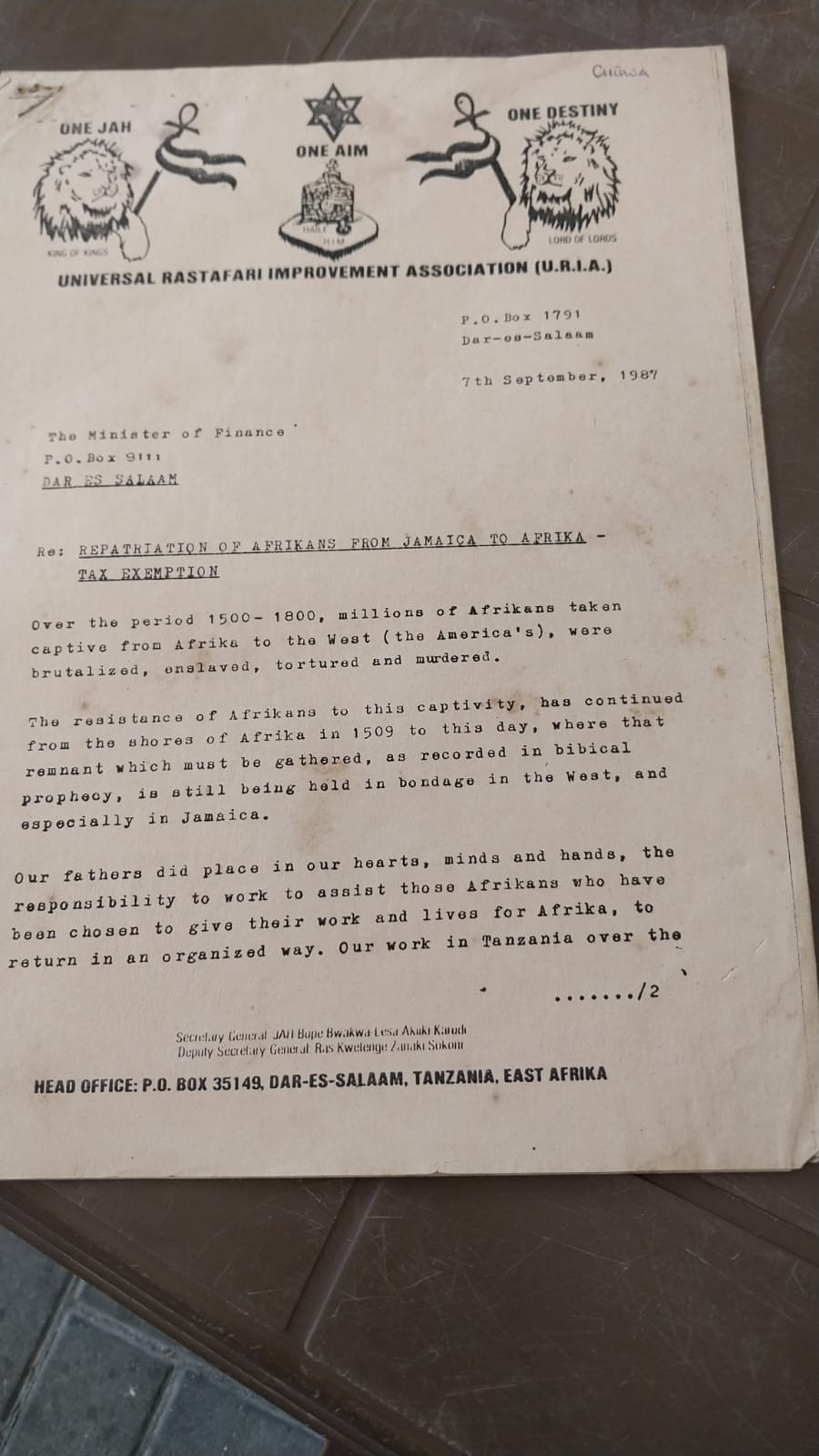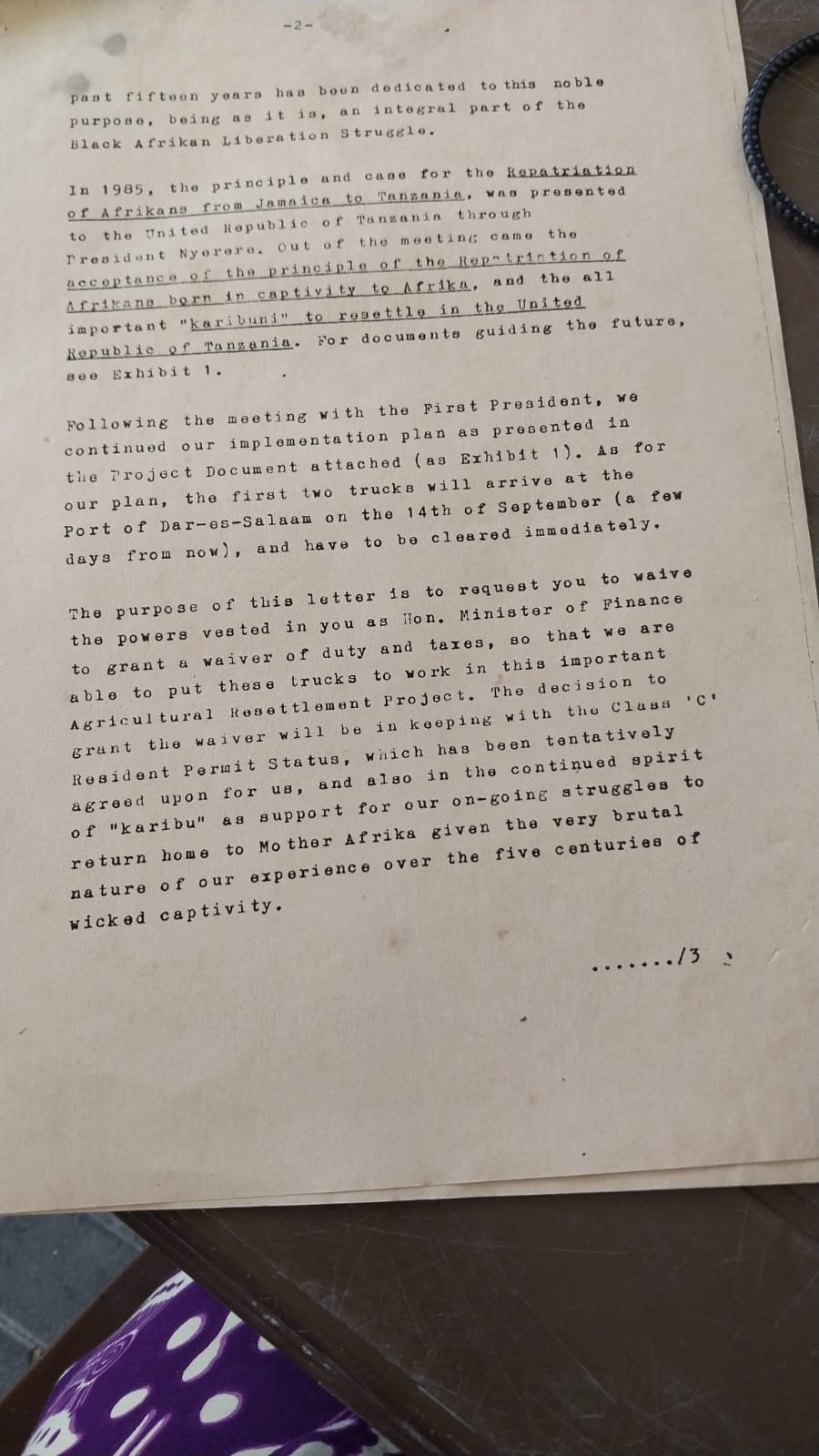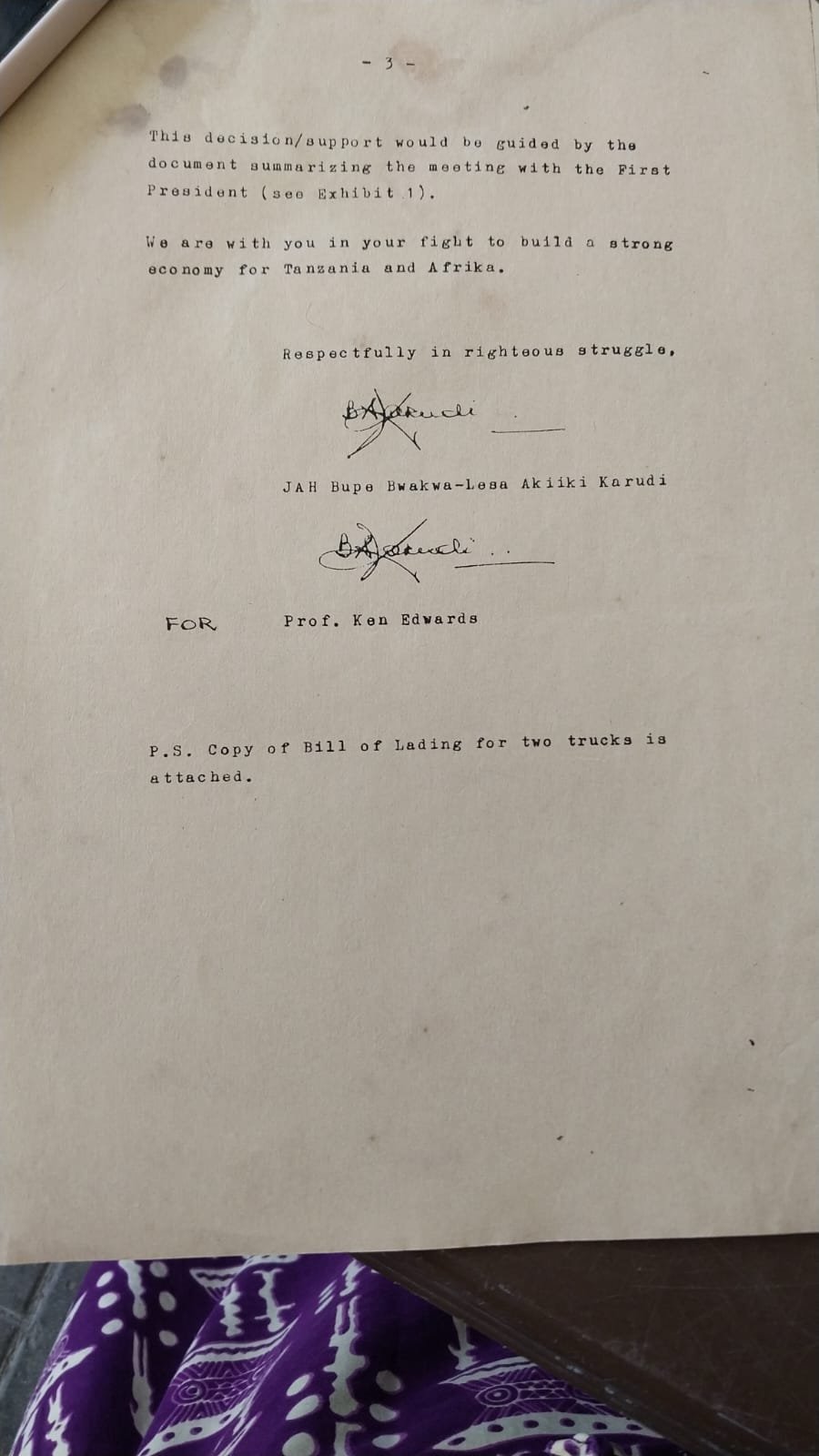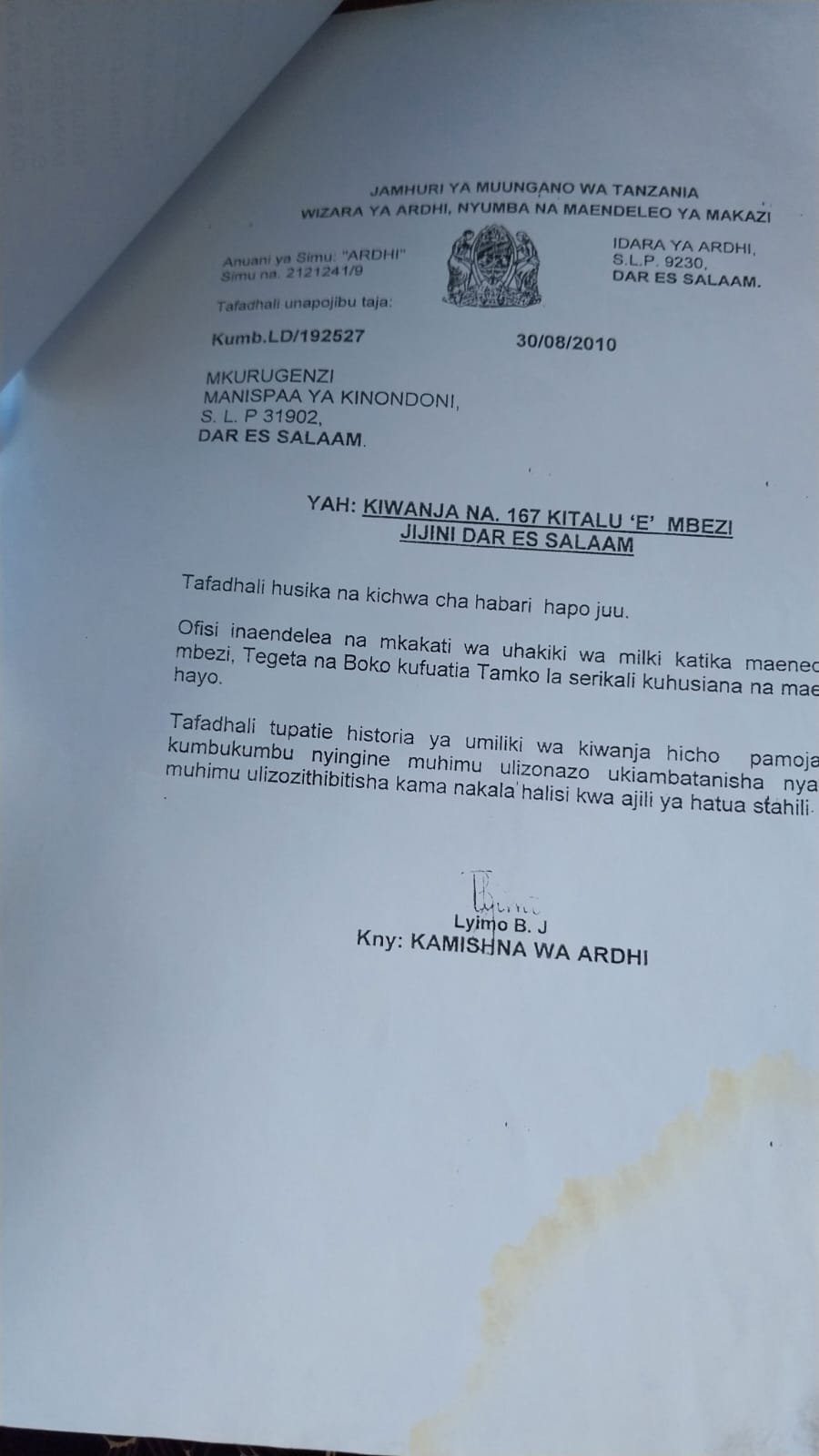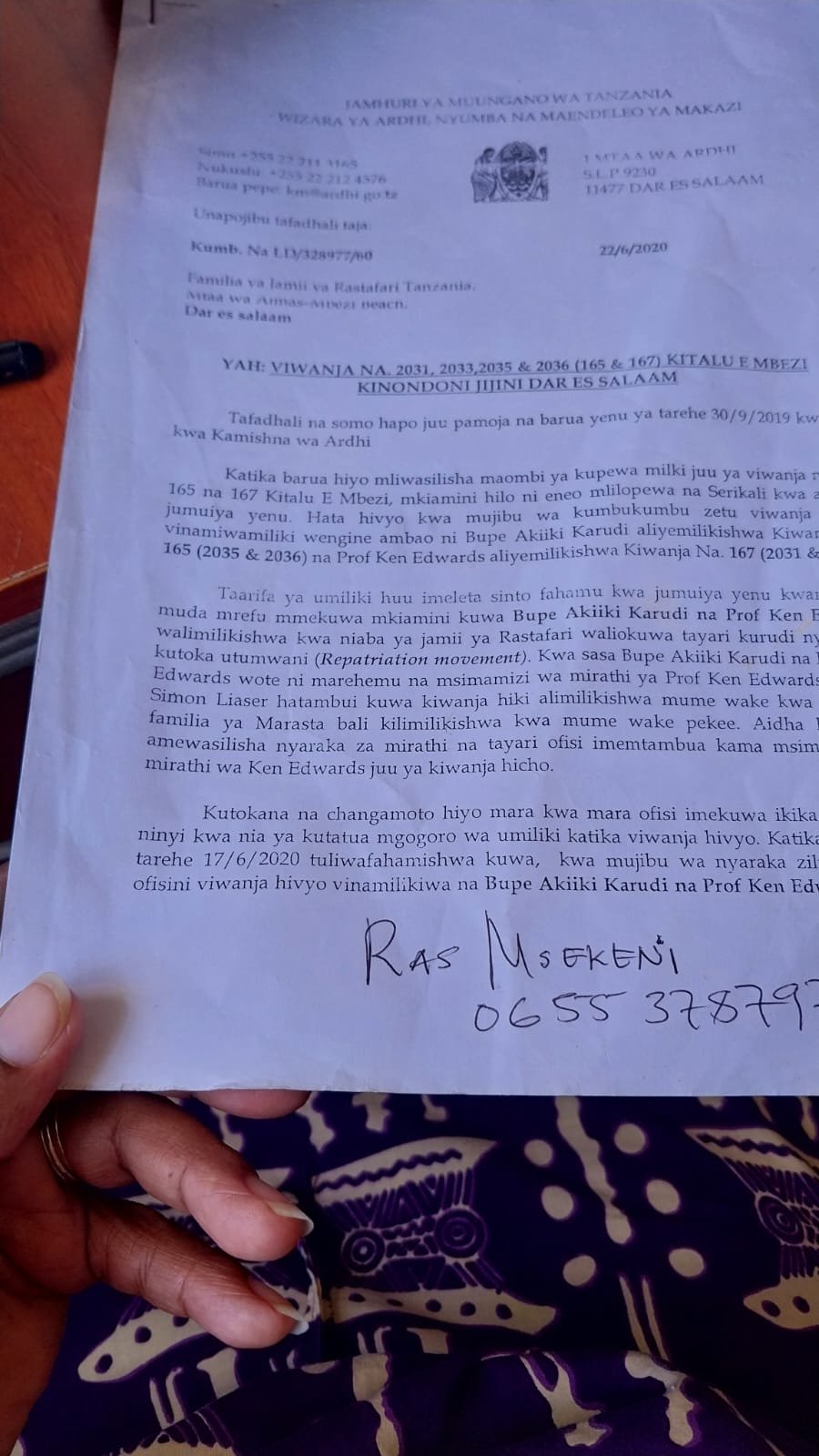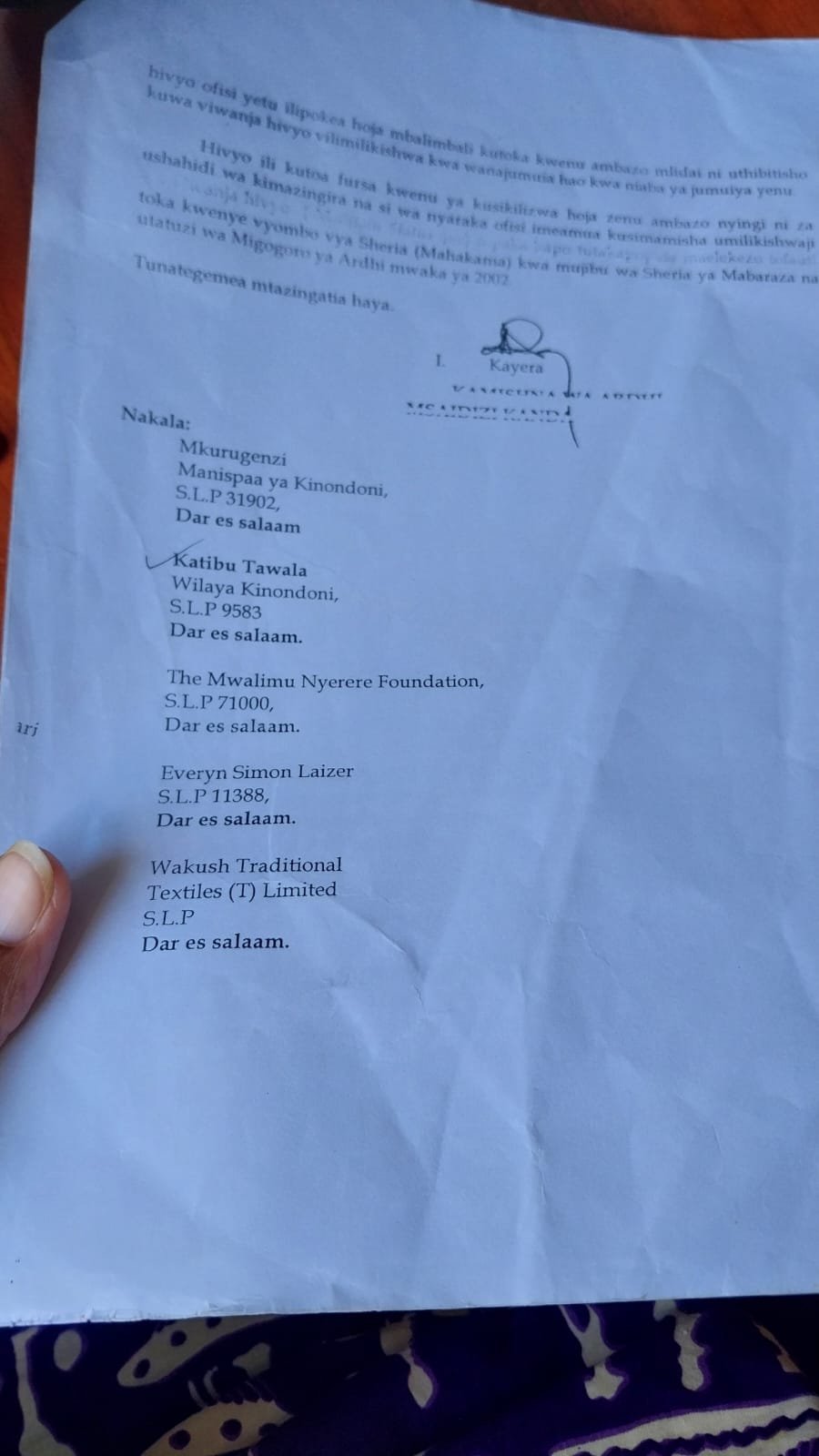On October, 18, 2017, the Black Agenda Report stated,
“In 1979, a Jamaican Rastaman, Joshua Mkhululi, approached the President of Tanzania, Julius Nyerere, with a serious request. He asked Nyerere to allow the wide-scale repatriation of Jamaican Rastafarians to Tanzania. Nyerere “agreed with the principle of black Africans returning to Africa.” In 1985, the government granted Rastas the “right of entry” into Tanzania and offered them permanent residency with the option for citizenship. For Rastafari, Africa was the Promised Land, and Nyerere’s government facilitated the “movement of Jah people.”












On April 19, I received the following URGENT EMERGENCY ALERT:
--------- Forwarded message ---------
From: 6Region African Diaspora Alliance in Tanzania <tanz6thregionrepats@gmail.com>
Date: Sat, Apr 19, 2025 at 6:55 AM
Subject: Mzee Saburi Omega, the face of The Right To Return
To: <right2return@6regiontz.org>, 6Region African Diaspora Alliance in Tanzania <info@6regiontz.org>, <michaelmwambeta@yahoo.com>, aminata.salash@gmail.com <aminata.salash@gmail.com>, <jamhigh@jhcuk.com>, Dr Peter Herbert <pherb5law@aol.com>, Donald Deya <ddeya@lawyersofafrica.org>
Greetings,
I am sending this email with an attached video and 3 documents, because I want to not only share the story but I also am appealing for your help in every way possible - especially with some of the processes we need to begin.
Fri April 11th 2025,
Our beloved Elder was taken from the house, Friday AM, and detained at Home Affairs/Immigration. Someone called them to say he is here illegally/out of status.
So they picked him up and detained him.
It was the blessings of the almighty, my prayer warriors, some good at heart Tanzanian rastas, and those beautiful souls in the form of officers - Babu was bonded out yesterday evening.We went back to the house, and he was prevented from entering by 2 security guards who were now in the compound.
I had to call the police who stepped in, and told them to allow him to get some clothes. He has been taken to a safe space, had dinner, and had a comfortable bed to sleep in. Kumshukuru mungu.
I need help to expedite the processing of his documentation so that he can have legal status in the country, as instructed by the commissioner of immigration.
Also with the process of getting this situation with where he has been living sorted, if possible, or to get another place where he can live out the rest of his days in peace, and maybe getting his wish to come through as well.
That wish is to have a place for the Historic Diaspora to transition when they 1st get here, if they need, and to have a community center and library for both sets of Africans - those living here and those just getting here - to access information about our history and a place for cultural exchange.
So if you can help in any way - and the help we need is to execute his documents urgently; to get legal advice from a Tanzanian advocate that has the experience and knowledge to represent the situation very well; and to get help to sustain him - please let me know.
I'm doing this through 6REGIONTZ as he asked us to take on his case, and that this is the prime example for the need to have the implementation of the Right To Return.
Tuko pamoja
Best Regards,
Nana Abena Grace A James Chairperson, 6regiontz
+255-756-680-488
Africa Lead Facilitator, SRDC
Facilitator, Africa-USA Chamber of Commerce
International Coordinator, A.C.E. Collective
THE VIOLATION OF ELDER RAS SABURI’S RIGHT TO RETURN BEGS US TO REVIST THE HISTORY OF THE RIGHT TO RETURN IN TANZANIA AS A VALUABE CONTRIBUTION TO THE UPCOMING DISCUSSION NEXT MONTH MANDATED BY THE RESOLUTION IN PREPARATION FOR THE AU THEME FOR 2025 “JUSTICE FOR AFRICANS AND PEOPLE OF AFRICAN DESCENT THROUGH REPARATIONS” THROUGH CONSULTATIONS ON AFRO DESCENDANTS, INDIGENOUS/ETHNIC ANCESTRY, REPARATIONS & THE 6TH REGION - ACHPR/Res.616 (LXXXI) 2024 .
”It has been my privilege to be associated with Mwalimu Nyerere for the past 25 years. During a visit to Harlem, New York, in the late 1960s Mwalimu extended an invitation to Africans in the Diaspora to come to Tanzania and participate in building a socialist African state. I came over through a new organization called the Pan-African Skills project and have lived in Tanzania ever since, for a quarter of the century.
Nyerere's Tanzania was a magnet then for anti-colonial activists and thinkers from all over the world. Uganda's President Yoweri Museveni, for instance, was deeply influenced by his time as a student at the University of Dar-es-Salaam. Museveni belonged to a study group led by the Guyanan Walter Rodney, who wrote his seminal book How Europe Underdeveloped Africa while he was a professor there.
The University of Dar-es-Salaam became the centre for the guerrilla-intellectuals and activists of African liberation movements. FRELIMO of Mozambique, the ANC and PAC of South Africa, ZANU and ZAPU of Zimbabwe, the MPLA of Angola and SWAPO of Namibia all had offices and training camps in Tanzania. The country also gave safe haven to US civil-rights activists, Black Panther party-members and Vietnam War resisters.
It was an exciting place to be. Under a head of state who valued equal rights, justice and development more than the pomp and power of office, Tanzania was at the heart of the anti-colonial struggle.”
- Ikaweba Bunting, The Heart of Africa. Interview with Julius Nyerere on Anti-Colonialism
Especially after declaring for African Socialism in the Arusha Declaration of 1967 (in Kiswahili, Ujamaa na Kujitegemea), Tanzania inspired many African Americans and other blacks in the diaspora to find their way to Dar es Salaam in the 1960s and 1970s. Malcolm X, Robert Williams, Queen Mother Audley Moore, Stokely Carmichael, and a legion of less well-known made their way there.
Malcolm X in Dar es Salem, Tanzania - October 1964
On June 28, 1964, six weeks after Malcolm’s return to New York from Africa where he met with the Organization of African Unity (OAU), Malcolm X and John Henrik Clark announced the formation of the Organization of Afro-American Unity (OAARU). During this period, Malcolm X stated,
“One of the things I saw the OAAU doing from the very start was collecting the names of all the people of African descent who have professional skills, no matter where they are. Then we could have a central register that we could share with independent countries in Africa and elsewhere. Do you know, I started collecting names, and then I gave the list to someone who I thought was a trusted friend, but both this so-called friend and the list disappeared. So, I’ve got to start all over again.” (Jan Carew, Ghosts In Our Blood, p. 61)
“The 22,000,000 so-called Negroes should be separated completely from America and should be permitted to go back home to our African homeland which is a long-range program; so the short-range program is that we must eat while we’re still here, we must have a place to sleep, we have clothes to wear, we must have better jobs, we must have better education; so that although our long-range political philosophy is to migrate back to our African homeland, our short-range program must involve that which is necessary to enable us to live a better life while we are still here.” (Interview with Malcolm X, by A.B. Spellman, Monthly Review, Vol. 16, no.1 May 1964)
On December 12, 1964, Malcolm answered a question about going back to Africa at the Haryou-Act Forum for Domestic Peace Corps in Harlem. Said Malcolm,
“You never will have a foundation in America. You’re out of your mind if you think that this government is ever going to back you and me up in the same way that it backed others up. They’ll never do it. It’s not in them. . . . . By the same token, when the African continent in its independence is able to create the unity that’s necessary to increase its strength and its position on this earth, so that Africa too becomes respected as other huge continents are respected, then, wherever people of African origin, African heritage or African blood go, they will be respected – but only when and because they have something much larger that looks like them behind them. With that behind you, you can do almost anything under the sun in this society . . . And this is what I mean by a migration or going back to Africa – going back in the sense that we reach out to them and they reach out to us. Our mutual understanding and our mutual effort toward a mutual objective will bring mutual benefit to the African as well as to the Afro-American. But you will never get it by relying on Uncle Sam alone. You are looking in the wrong direction. Because the wrong people are in Washington D.C. and I mean the White House right on down . . . . “ (Malcolm X Speaks, p.210-2)
Malcolm X was assassinated before he was able to collect the names and the OAAU was successfully destroyed by the FBI. However, the Repatriation program survived. According to William Sales Jr.,
“An aspect of SNCC’s international orientation which survived the organization was the establishment of the Pan-African Skills Project. This was an idea of Forman’s, which reflected Malcolm’s desire to provide African American technical assistance personnel to developing African nations, which came to life in 1969. Foreman’s leadership in the Detroit Black Economic Development Conference of 1969 resulted in the development of a practical program for that old nationalist staple, reparations to African Americans. The Black Manifesto presented at New York’s Riverside Church on May 4, 1969 resulted in increased funding for programs controlled by Blacks. One of the most effective of these was the Pan-African Skills Project. Headed up by former SNCC chairperson, Irving Davis, the Project sent over 250 Afro-American teachers, technicians, and professionals to Tanzania and a smaller number to Zambia. It was probably one of the two most concrete manifestations of Pan-Africanism to emerge subsequent to Malcolm’s initiatives of 1964.” (Malcolm X and the Organization of Afro-American Unity p. 1999).
Fanon C. Wilkins of Syracuse University writes,
“Founded in January 1970 by Irving Davis, former Deputy Chairman of the International Affairs Commission of the Student Non-Violent Coordinating Committee (SNCC), the Pan-African Skills Project recruited African Americans with technical skills and ‘practical work experience’ to ‘assist in the internal development of progressive African nations. . . . Pan African Skills was the brainchild of Irving Davis, who by 1970, had a long history of political activism dating back as early as 1958 . . . . After joining SNCC in 1966, Davis came under the tutelage of James Forman, who headed SNCC’s International Affair Commission. . . . Many African American activists were disillusioned with the minimal gains made under the banner of civil-rights and the co-opted politics of ‘Black-power’ and sought to place their energies in Africa, their ancestral motherland. One of the more exciting countries for African Americans was Tanzania, which by 1967, was engaged in an ambitious socialist development experiment called ‘Ujamaa’. Tanzania also became one of the leading independent African nations lending political and material support to African nations still fighting for independence, namely Rhodesia, South Africa and the Portuguese colonies of Angola, Mozambique and Guinea-Bissau. As a progressive African nation, Tanzania emerged as a political base for revolutionary activists from around the world, not the least of which included African-Americans. It was in this context that the Pan-African Skills Project was created out of the diplomatic activities of SNCC’s International Affairs Commission with Tanzania, and the individual initiative of Irving Davis, who believed strongly in Tanzania’s principles of self-reliance and commitment to Ujamaa.” (We Will Run While Others Walk: The Pan African Skills Project and Ujamaa Socialism, 1970-1980”)
Many people are familiar with the story of Pete O’Neal, known as the “Panther in Africa”.
“After independence the wider African community became clear to me. I was concerned about education; the work of Booker T Washington resonated with me. There were skills we needed and black people outside Africa had them. I gave our US Ambassador the specific job of recruiting skilled Africans from the US Diaspora. A few came, like you. Some stayed; others left.
We should try to revive it. We should look to our brothers and sisters in the West. We should build the broader Pan-Africanism. There is still the room - and the need.”
- Julius Nyere interview with Ikaweba Bunting
Bhoke Nyerere, the Grand daughter of Tanzania's founding President, Mwalimu Julius Nyerere, the late Prof. Ikaweba Bunting, and Eliud from the Mwalimu Nyerere Foundation
FOR A REPORT ON THE STATUS OF REPATRIATES IN TANZANIA, SEE THE SURVERY BELOW.















PROPOSAL FOR ENHANCED ENGAGEMENT WITH AND THE INTEGRATION OF THE AFRICAN HISTORIC DIASPORA IN ALL AFRICAN MEMBER STATES UNDER THE RIGHT OF RETURN DECLARATION.
